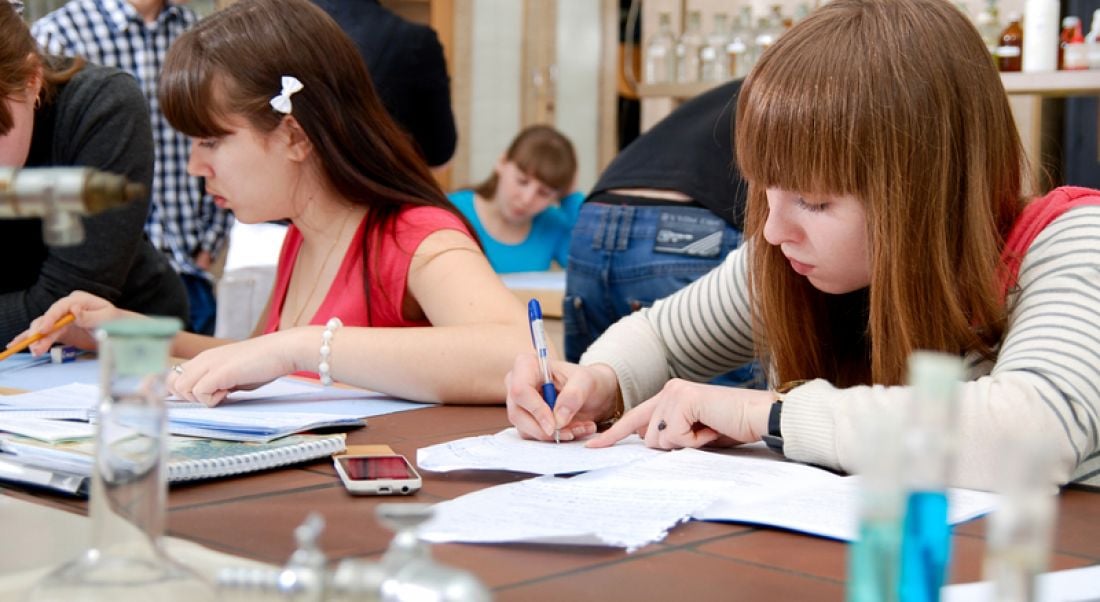As almost 57,000 students receive their Leaving Certificate results in Ireland today, Project Maths has proven its success and interest in STEM is growing, but we can’t forget foreign languages.
Science Foundation Ireland (SFI) announced a number of milestones reached with this year’s Leaving Cert results. For starters, almost 450 additional students took chemistry, 84pc of whom opted for the higher level paper. Meanwhile, physics saw the biggest percentage increase across all the science subjects this year at 11.3pc.
Business and employer association Ibec welcomed the continued increase in the uptake of higher-level maths, with 27.3pc of students sitting these papers this year compared to less than 16pc three years ago, and it has been revealed that more than 72pc of those achieved a minimum grade C.
“Increased ability in maths is required by a huge range of businesses. The subject also opens the possibility for larger numbers of students to take science and technology courses that have higher-level maths as a basic requirement,” said Ibec head of education policy Tony Donohoe.
Project Maths lessons to be learned
Donohoe highlighted the career opportunities in technology and the predicted growth of this sector as the Irish economy recovers, and his sentiments have been echoed by chief executive of the American Chamber of Commerce, Mark Redmond.
“Each year, industry looks to the Leaving Cert results as an indicator of the quality of talent that is being produced by our education system. It is, therefore, very encouraging that we are continuing to see an increase in the number of students studying the vital STEM subjects, particularly at a higher level,” he said.
Redmond credited the ‘bonus points’ system for driving higher numbers to take higher-level maths and believes further reform could encourage students to choose subjects relevant to future careers.
“Unfortunately, we continue to see high failure rates in the science subjects, which are key skills for many of the modern foreign direct investment companies located in Ireland. As the lessons of Project Maths continue to be learned, they should be adapted and applied to support students studying in the sciences also,” he added.
Students have STEM subjects in mind
That said, a recent survey of 1,000 Irish secondary school students aged 13 to 18 revealed that STEM subjects are at the forefront of their minds.
The survey, commissioned by BT, organiser of the BT Young Scientist & Technology Exhibition, found that 86pc of students believe STEM subjects are likely to offer the best career opportunities, and more than 72pc plan to study a STEM subject at third level.
However, while 73pc said STEM subjects are promoted in their schools, 36pc believe that boys receive more encouragement to pursue these subjects than girls.
Foreign languages in decline
Additionally, Ibec highlighted declining numbers of those taking French and German at Leaving Cert level. But with many international tech companies locating their European headquarters in Ireland, language skills are not to be overlooked.
“We continue to see significant numbers of unfilled job vacancies that require modern languages,” said Donohoe.
“It’s vital that we don’t find ourselves at a competitive disadvantage when it comes to selling into global markets and attracting foreign investment.”
UK students favour coding careers
Meanwhile, in the UK, a survey from online learning platform FutureLearn ahead of the release of A-Level results tomorrow, ranks coding as the top career choice among 1,000 students aged 16 to 18, with 23pc of the vote.
Medicine is UK students’ second choice at 22pc, followed by law and marketing at 16pc, and forensic science at 15pc.
Chemistry students image by Vadim Ivanov via Shutterstock




